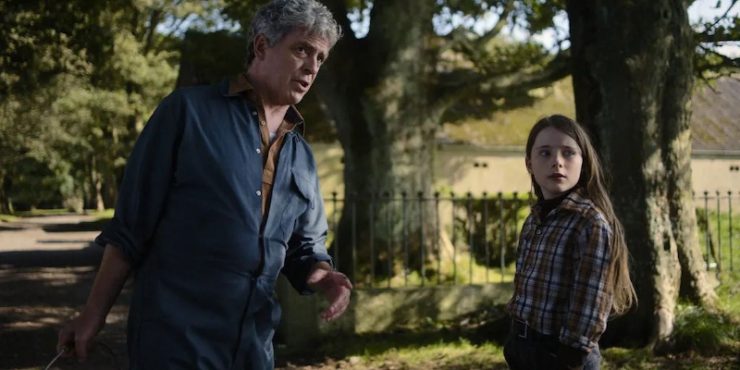There’s a simplicity to the story and the characters throughout The Quiet Girl that could possibly misdirect your expectations. In a tight 94 minutes, writer-director Colm Bairéad manages to exact a wealth of suspense and feeling, and he does so without any high concept plot conceits or overarching melodrama. It’s title suggests a protagonist whose mousiness may hide a burgeoning talent (in a comedy) or a tragic secret (in a drama). The film’s sparse storytelling wants you to fill in gaps with your own narrative anticipation and the minor key tempo might suggest a more maudlin tale, but the brilliance in The Quiet Girl is how it never settles for cheap drama or sentimentality. It instead takes the most straightforward path, proving how that was the best way all along.
The film is based on a novella by Irish writer Claire Keegan, and Bairéad sets the story in (mostly) the native Irish language. The quiet girl from the title is Cáit (Catherine Clinch), a neglected child in a disorderly, caustic home. Her numerous siblings are uncaring and find her strange, her mother (Kate Nic Chonaonaigh) speaks her every word with conspicuous, overwhelmed frustration, and her father (Michael Patric) is a derelict gambler and drinker. Her life is not a horror show of abuse, but instead a lonely existence surrounded by family that is unwilling or unable to provide love. When Cáit’s mother becomes pregnant once again, she chooses to send Cáit away for the summer, in the hopes of easing at least some of her domestic burden. With Cáit’s penchant for wandering away without warning – and her chronic bed-wetting problem – she appears to be the best candidate for going to live with distant relatives.
Those relatives are Eibhlín (Carrie Crowley), a distant cousin, and her husband Seán (Andrew Bennett). Eibhlín instantly approaches Cáit with earnest kindness, a far cry to what the young girl is used to. Seán proves harder to win over. The few words he speaks are mumbled out in monosyllabic grunts. Still, this home is a welcome change to her previous life. No longer is her bed-wetting treated with hostility or her solitude mistaken for eccentricity. There are some oddities: where Seán is taciturn, Eibhlín gets struck with sudden bouts of unexplained melancholy. There’s also the young boys clothes that Cáit is forced to wear after her father mistakenly drives away with her suitcase. Eventually, things settle and even Seán warms to the young girl as she assists them on the farm. Experiencing true contentedness for the first time in her short life, Cáit begins to bloom in her new home. That is, until she discovers a terrible secret that reconfigures everything she thought she understood about he idyllic new home.
Like all great screenplays, Bairéad reveals details in drips and drabs, small revelations come out through day-to-day behaviors and actions. I’ve never read Claire Keegan’s stories, but The Quiet Girl reminded me of another beloved short story writer, Canadian Nobel laureate Alice Munro, whose brilliance was always in showing how much effect the micro has on the macro. Bairéad’s direction is precise and steady, always trusting the audience, and expertly creating these tiny moments that feel like watershed emotional events. It’s difficult to go into detail here without spoiling, but the way this film keeps you tightly engrossed while having hardly any direct action is masterful. The sudden moments of emotion are riveting not because they are shocking but because they are so plainly humane, and the performances from Crowley, Bennett, and the young Clinch, bear that out beautifully.
We may be living at the height of the popularity of nicecore fiction. More than ever, audiences are requiring pleasantness from their films, books, and television, a dubious trend that disqualifies challenging art and gives people a pass to not engage with anything that may cause them discomfort. I thought about this as I watched The Quiet Girl, a film about the true restorative power of kindness, which feels no need to erase the harrowing aspects of life to highlight the moments of grace. I didn’t find this to be a particularly happy or sad film, and it’s success does not hinge on the strength of its mood, but the clarity of its purpose. Not since Sarah Polley’s Away From Her in 2007 has a debut feature film felt so profound while still feeling so grounded, as if guided by a master veteran. This is nominated for the upcoming International Feature Oscar. It is perhaps the most unheralded of the bunch, but it is the best and most effective of them all.
Written for the Screen and Directed by Colm Bairéad










